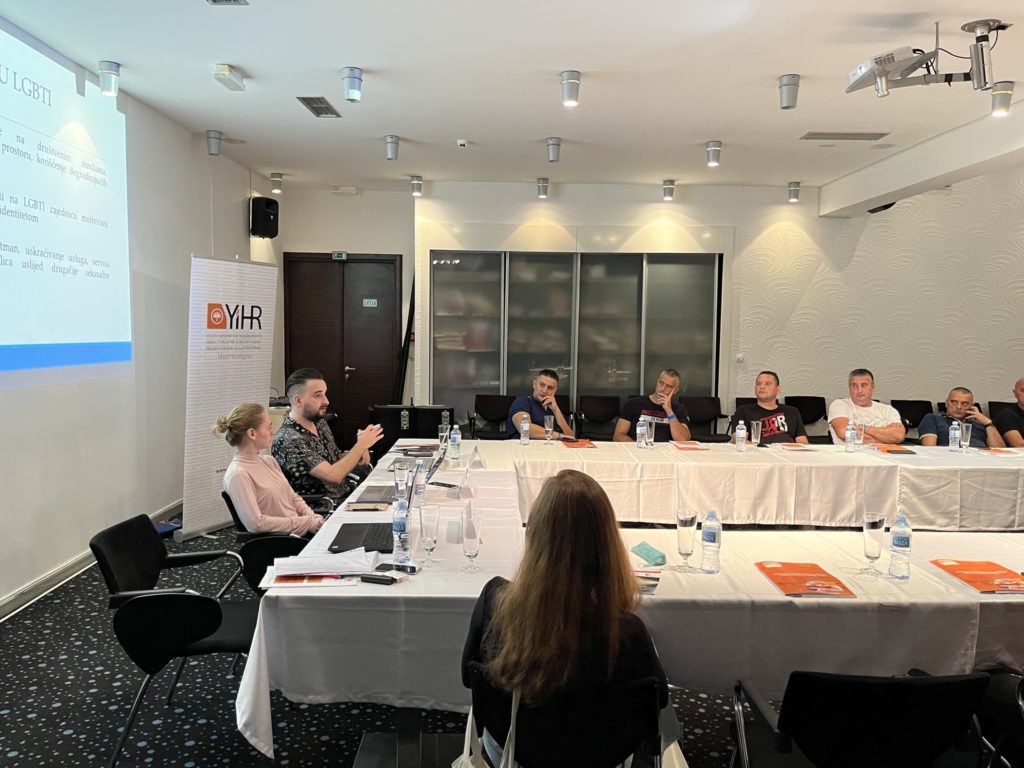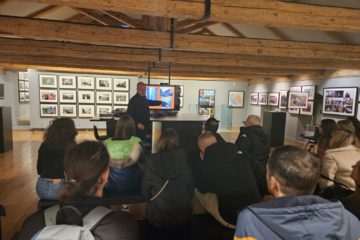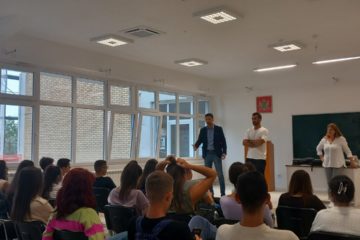The Youth Initiative for Human Rights (YIHR) organized a three-day seminar on the topic “Discrimination Has the Same Meaning for All” within the School of Political Studies, focusing on Human and Minority Rights – with a special emphasis on the LGBT community. The seminar took place in Ulcinj from October 13th to 15th and was intended for police officers, officials of the Institute for Execution of Criminal Sanctions (UIKS), employees of social welfare centers, psychologists from health centers, and representatives of the Law Faculty students.
To our satisfaction, the seminar was opened in collaboration with Stevan Milivojević, an activist from the LGBT Forum Progres. Through his lecture “The System’s Response to Hate Speech and Hate Crimes Directed at the LGBT Community,” he acquainted the participants with what a system, through its individual members, can do to minimize negative phenomena related to homophobia, transphobia, hate speech, and hate crimes, and discrimination against this community. Using historical context, including the founding of the first LGBT community in Montenegro, he presented the challenges faced by the LGBT community from its early days to the present, emphasizing hate speech and hate crimes as key issues. He concluded that things have improved significantly over the past decade and that the legal framework has considerably improved the position of the LGBT community in Montenegro, currently positioning Montenegro 12th on the ILGA map in Europe, with a 61% legal compliance, which is a significant achievement. However, things are not as they seem in practice. The enacted laws are not aligned with other laws of this country; judges and prosecutors still make decisions on criminal charges invoking the Law on Public Order and Peace rather than the Law on Prohibition of Discrimination. LGBT individuals can safely walk in Podgorica but not in other cities of Montenegro. This raises the question of whether this is true freedom, and whether this is the Montenegro positioned 12th on the ILGA map?
On the second day of the seminar, we started with Slavko Milić, the president of the board of the Montenegro Criminology Center and a long-time police officer. His focus in the lecture was on the right to freedom of assembly, challenges and limitations, and the positive role of the police in protecting human rights, especially LGBT individuals. His presentation emphasized the importance of clear compliance with legal rules and the personal responsibility of police officers regarding any public gatherings, particularly the ethical behavior concerning vulnerable groups like the LGBT community. This segment of the lecture was specifically directed towards the rights to freedom of assembly and all obstacles and limitations, as well as the positive role of the state in these cases. Since the target group included, among others, members of the police, with the upcoming Pride Parade in mind, we took the opportunity to go through some rules and legal obligations of Montenegro, both international and national. “The right to freedom of assembly also includes the right to choose the time, place, and manner of assembly, and the authorities can request a change in time only under certain conditions. … For the rights of LGBT persons to be protected, the police need to be aware of all the specific vulnerabilities of these individuals. Montenegro is still fertile ground for stereotypes and prejudices, especially regarding LGBTIQ individuals,” emphasized Milić. We dedicated a specific part to entrenched prejudices against this community and discussed the reasons for such attitudes.
Nerma Dobardžić, the Deputy Ombudsman, spoke about the concept and forms of discrimination, the burden of proof in the process of protection against discrimination, and examples of the Protector of Human Rights and Freedoms’ practices. Speaking about discrimination, she pointed out to the seminar participants the difference between direct and indirect discrimination and the three constitutive elements necessary to examine discrimination. She emphasized the importance of the open clause “other personal characteristics” in Article 2, paragraph 2, of the Law on the Prohibition of Discrimination and provided practical examples. She explained the procedure of the Protector in relation to protection against discrimination, with a special focus on the burden of proof, and the Protector’s activities in a preventive and reactive sense in handling complaints and on its own initiative. She also drew the participants’ attention to the importance of the Law on Same-Sex Partnerships. However, it is essential to work intensively on linking other legal acts with the provisions of this law, as improving the normative framework is necessary but not sufficient for the full integration of LGBT individuals into all spheres of society – Dobardžić concluded.
Milan Sekulović, a civic activist and journalist, spoke about the concept and types of discrimination in Montenegro, with a focus on public opinion research. At the very beginning, concerning discrimination, he thanked the state for discrimination, as well as us as citizens of Montenegro, because we are a very discriminatory society, which is a conclusion we can come to based on research but also based on encounters with people. He stated that the source of discrimination always lies in identity, explaining the concept of individual and collective identity. He emphasized that due to their uniqueness, individuals are discriminated against because who we are or how others perceive us often becomes a problem and a source of what we call discrimination. Reflecting on a very good legislative framework in most areas, he concluded, like all seminar lecturers, that there is no adequate implementation. All research, whether conducted by the non-governmental sector, international organizations (primarily the European Union), or Montenegro’s institutions, shows that the most discriminated groups in Montenegro are the Roma, women, persons with disabilities, the LGBT population, the elderly, and lately, poor citizens are also mentioned as victims of discrimination. Citing research conducted in Montenegro, he acquainted the participants with data that 67% of women consider themselves discriminated against compared to men, one-third of citizens do not want to live in the same country as LGBT individuals, 43% of citizens believe that LGBT individuals should not have the same rights as other citizens. Another alarming fact is that 90% of persons with disabilities feel discrimination. He concluded that discrimination is a negative phenomenon that breaks bridges among individuals and social groups. He stated that it is a fact that there is discrimination in Montenegro, although progress is observed in certain areas, emphasizing that we have a lot of work to do to achieve full equality, which is very difficult to attain, but we should strive for it at least. Personally and professionally, he believes that if the recommendations of the Ombudsman’s institution were binding, this society would certainly be better.
The third day of the seminar covered lectures by Bojan Božović, an advisor in the Ministry of Justice, and Ksenija Rakočević, a professor at the Faculty of Philology, University of Montenegro.
Bojan Božović explored various cases before the European Court of Human Rights in Strasbourg in his presentation. He emphasized that the state must not have double standards, i.e., different approaches in laws and practice. “In our normative framework, it is prescribed that a legal procedure can be initiated after exhausting all legal remedies, with the last instance being the Constitutional Court in our country. Unfortunately, there are numerous lawsuits that do not respect all regulations because, in most cases, they do not comply with the standards, so they are often dismissed,” said Božović. He analyzed in detail cases in which it is possible to avoid proceeding before the Constitutional Court but stressed that in other circumstances, a rule prescribed by many legislative norms must exist. He also emphasized that time is needed to understand human rights and provided examples from the past, where even in some Western European countries, homosexuality was a criminal offense until the 1970s. The European Court monitors whether the applicant and the application comply with the standards of Article 1 of the European Convention, which guarantees rights to every person located on the territory and under the jurisdiction of the defendant state. Božović reviewed at least 8 cases that came before the court and, along with the participants, commented on each of them to explain in more detail and practically what aspects are taken into account before making a decision. Most cases concerned the vulnerable category of the LGBT population. He concluded the lecture by emphasizing that law is very complex, and human rights demonstrate their complexity daily in various life situations. However, what is common to all is that these rights relate to every individual, and every society and state understands the importance of human rights. Through various mechanisms, including the European Court of Human Rights in Strasbourg, efforts are made to protect and enable the general application of these rights without discrimination on any basis.
 Ksenija Rakočević, the last lecturer at the seminar, delivered a lecture titled “Reconstruction of the Patriarchal Code in Montenegrin Culture.” In the introduction, she clearly distinguished between gender and sex, emphasizing that feminism arises from their intertwining relationship. According to her, feminism is essentially “the right to choose and equal rights in unequal starting points.” She defined gender as a psychological dimension related to a person’s sense, while sex refers to the biological and physical characteristics of each individual. She also emphasized that sexuality has been present in human actions since ancient times, using the example of Narcissus falling in love with his reflection in the water. As a literature professor, she analyzed various works from different periods of human evolution and provided examples, such as Narcissus, to illustrate the continuity of sexuality throughout history. She addressed discrimination, highlighting that it encompasses not only violence but also inappropriate jokes that exceed the boundaries of acceptability and disrupt individuals’ comfort. During the lecture, intensive discussions were held on different aspects of equality, discrimination, and tolerance. Special emphasis was placed on the need to deconstruct patriarchal norms to achieve true equality and reduce discrimination.
Ksenija Rakočević, the last lecturer at the seminar, delivered a lecture titled “Reconstruction of the Patriarchal Code in Montenegrin Culture.” In the introduction, she clearly distinguished between gender and sex, emphasizing that feminism arises from their intertwining relationship. According to her, feminism is essentially “the right to choose and equal rights in unequal starting points.” She defined gender as a psychological dimension related to a person’s sense, while sex refers to the biological and physical characteristics of each individual. She also emphasized that sexuality has been present in human actions since ancient times, using the example of Narcissus falling in love with his reflection in the water. As a literature professor, she analyzed various works from different periods of human evolution and provided examples, such as Narcissus, to illustrate the continuity of sexuality throughout history. She addressed discrimination, highlighting that it encompasses not only violence but also inappropriate jokes that exceed the boundaries of acceptability and disrupt individuals’ comfort. During the lecture, intensive discussions were held on different aspects of equality, discrimination, and tolerance. Special emphasis was placed on the need to deconstruct patriarchal norms to achieve true equality and reduce discrimination.
In light of all the above, we concluded the seminar by agreeing that significant progress has been made in our society, highlighted through the adoption of a comprehensive legislative framework. However, we recognize that there is still much work to be done in raising social awareness and continuously educating officials. Our goal is to strive for greater equality, as this right belongs to everyone. The Youth Initiative for Human Rights will continue its projects and activities aimed at contributing to the improvement of the position of not only the LGBT community but also all vulnerable social groups. We will continue with dedication and enthusiasm, promoting justice, equality, and inclusiveness to collectively build a society where every voice is heard and every person is respected.



0 Comments